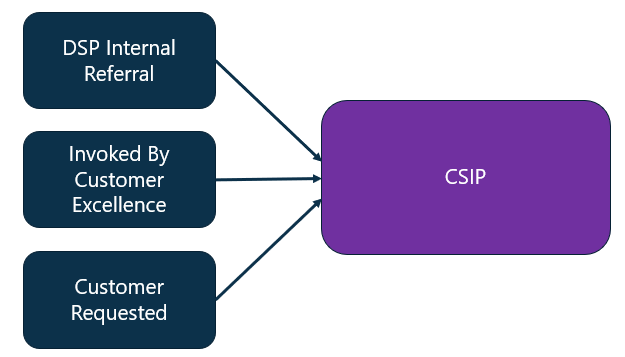DSP - ITIL Continual Service Improvement Process (CSIP)
March 2025 - V1.4
Kevin Blackshaw - Group Head of Service Management
Haylee Morley - Continuous Service Improvement Manager
Review Cycle - Annually - Q2

Contents
- Document Control
- Section 1 - Introduction
- Section 2 - What is Continual Service Improvement?
- Section 3 - CSIP Aims
- Section 4 - CSIP Scope
- Section 5 - CSIP Components
- Section 6 - Accessing CSIP
- Section 7 - CSIP High Level Process
- Section 8 - DSP CSIP Sentiment Rating
- Section 9 - What happens when a customer expresses dissatisfaction with service and their sentiment is RED?

Confidentiality and Copyright
The information contained in this document is confidential and is issued by DSP-Explorer (DSP) on the understanding that it will be used only by the staff of, or consultants to, the Client and where consultants are employed, the use of this information is restricted to use in relation to the business. In particular, the contents of this document may not be disclosed in whole or in part to any other party without the prior written consent of DSP-Explorer © - Database Service Provider Global Limited. All rights reserved.
Validity of Information
DSP-Explorer has made every effort to ensure that all statements and information contained herein are accurate as per the document release date. Any questions regarding the content of this document should be directed to our Service Delivery Department - ServiceDelivery@dsp-explorer.com
Version
| Version | Date | Update | Owner |
|---|---|---|---|
|
1.0
|
03/01/2023
|
Process live
|
KB
|
|
1.1
|
18/04/2024
|
Annual Review - Revised Sentiment Tracking to Incorporate Scoring – Section 6
|
KB
|
|
1.2
|
19/04/2024
|
Annual Review - Edited in review Service Management Scope
|
HM
|
|
1.3
|
25/04/2024
|
Annual Review - Added Transition from CSIP to Service Management guidance
|
HM
|
|
1.4
|
30/12/2024
|
Section 8.1 added - The benefits of providing a sentiment rating
|
KB
|
Document Review
| Reviewers | Date | Update | Owner |
|---|---|---|---|
|
KB/HM
|
31/05/2024
|
Review Complete
|
KB
|
|
KB
|
19/03/2025
|
Review Complete no material changes to Process
|
KB
|
Section 1 - Introduction
Welcome to the DSP community, we offer award-winning IT consultancy and managed services for Oracle, Microsoft and Google technologies. We specialise in data platform management, application development, engineered systems and Cloud with a strong presence in Oracle RDBMS, OCI, Exadata, SQL Server, Azure, APEX, and GCP. DSP is a leading technology partner in the UK and has been recognised for that by our technology partners and industry through a wide range of awards and accolades.
As a DSP Managed Services Customer – DSP Offer a range of ITIL based processes to provide Customer Excellence and a standardised our approach to IT Service Management offering. The following document is a brief overview of Problem Management and how the Problem Management Process works at DSP. While offered as a default component of our Managed Service, both Professional Service customers and those customers undergoing Transition (onboarding) can access Problem Management on request via their Account Manager.
Section 2 - What is Continual Service Improvement?
The Aim of CSIP at DSP is to define and execute specific initiatives aimed at improving the efficiency and efficacy (effectiveness) of services and processes; based on the results of service reviews, the voice of the customer and process evaluations. The resulting initiatives are either internal initiatives pursued by DSP or collaborative initiatives designed to improve a customer’s service.
- CSIP has been designed to record and track both re-active and proactive improvement initiatives at a higher level than is usually possible within the scope of a ticket (ITSM toolset / Cherwell) or email and the associated meeting CSIP forum can act as an IT Steering (Governance) forum with key customer stakeholders.
- CSIP initiatives usually have a 1 to 1 relationship with DSP customers.
- Where possible CSIP initiatives should have a ticket reference in DSP’s ITSM toolset (Cherwell), however, where the improvement initiatives are procedural or commercial, it is possible the item will only be allocated a CSIP reference number and will not have a corresponding ticket reference in the DSP ITSM Toolset.
Section 3 – CSIP Aims
- To evaluate, analyse, and make necessary recommendations to improve service
- Increasing the cost-effectiveness and process efficiency of the IT service while maintaining a high level of customer satisfaction
- To ascertain and implement activities to increase the quality of the IT service and improve the effectiveness and efficiency of the IT service management process
- To ensure that a standard and relevant method is used for quality management
- To help foster long-term, meaningful relationships
- Learn from past successes and failures
Section 4 – CSIP Scope
- CSIP is an optional service provided to DSP customers and is not part of the default Managed Services (MS) offering.
- CSIP is a Managed Service Process. However, CSIP can be invoked by Professional Services or Transition in conjunction with Customer Excellence as part of the Customer Journey to provide a seamless and consistent forum for the customer as their services move through their service lifecycle/customer journey.
- CSIP is not limited to customer PROD and DR Environments and can span all customer environments.
- A Customer Excellence-chaired forum at a frequency agreed upon with the customer (whereby recommended frequencies include one week (high attention/focus), fortnightly (recommended), monthly (can be aligned with SRM meetings) or quarterly
- A CSIP Tracker is unique to the customer that is updated during each CSIP engagement. The CSIP tracker is centrally hosted at DSP, and a copy is issued to customer stakeholders ideally within 1 hour of the conclusion of the specific CSIP Meeting Engagement
- Customer Excellence Sentiment Tracker – as part of the CSIP process each customer is asked to rate their experience of DSP’s services. The sentiment is then recorded in a rolling RAG (Red / Amber / Green) format and actions required to improve the sentiment are then added to the title page of the CSIP tracker (for customer issues). The sentiment provided by the customer is also recorded in the DSP Global Customer Sentiment tracker for access within DSP. Should any customer report a RED status the internal Service Excellence escalation process is initiated
- Termination and Lesson Learned Report Template – Internal report issued to SNR DSP Managers indicating why a customer ceased service with DSP and any improvement that can be implemented to prevent further issues with active customers


DSP CSIP can generally be accessed or involved as a result of 1 of 3 methods (shown left). A DSP internal reference usually occurs where a customer contacts their Account Manager and the Account Manager engages the Service Excellence Team.
Section 8 - DSP CSIP Sentiment Rating
Section 8.1 - The Benefits of Providing a Score
Sentiment is a quick and simple way for DSP to check in real time how customers feel about our service. It prompts conversations about the standard of service and what DSP might need to do to improve service for the benefit of the customer.
DSP use sentiment to tease out any concerns and if suitable, comments on what’s working well (i.e. what don’t you like about our service and what would you like DSP to improve or what do you like about our service, and why?). If comments and a score are recorded to indicate a drop in standards, we can rapidly course correct to ensure the required improvements are recorded, tracked and actioned all the while with high visibility to the customer. It’s a reasonably frequent and dynamic “temperature check” allowing customers to raise, and DSP to address, any issues with service swiftly.

Section 9 - What happens when a customer expresses dissatisfaction with service and their sentiment is RED?
On the rare occasion where a customer expresses dissatisfaction with the service provided by DSP, DSP’s Service Excellence Team engages with the client to design and manage a recovery plan which focuses the appropriate DSP resources on the key issues facing the customer. DSP have a fully documented process and rapid response team to ensure any customer dissatisfaction is remedied swiftly with transparency and high-quality frequent communications.
CE actions include but are not limited to:
- Review and increase CSIP Meeting Frequency
- The customer is escalated and discussed 2x per week on the MS Manager’s Forum
- An action (Recovery) Plan is created and managed
- Communication is improved via CSIM
- Service Excellence co-ordinate and carry out internal calls with Key DSP Stakeholders
- Cherwell (ITSM Toolset) status is changed to indicate escalated
Did you know we do more than Managed Services?
Meet the Customer Excellence Team
At DSP-Explorer, we have a dedicated team to ensure our customers are happy with the service we're providing. If you'd like to meet with the team, get in touch today!


.png?width=250&height=56&name=stonewater-logo%20(1).png)






